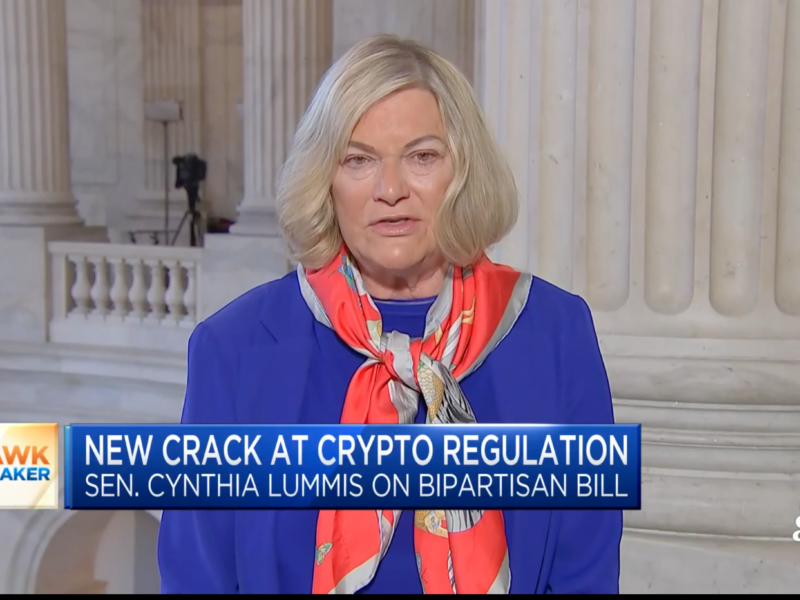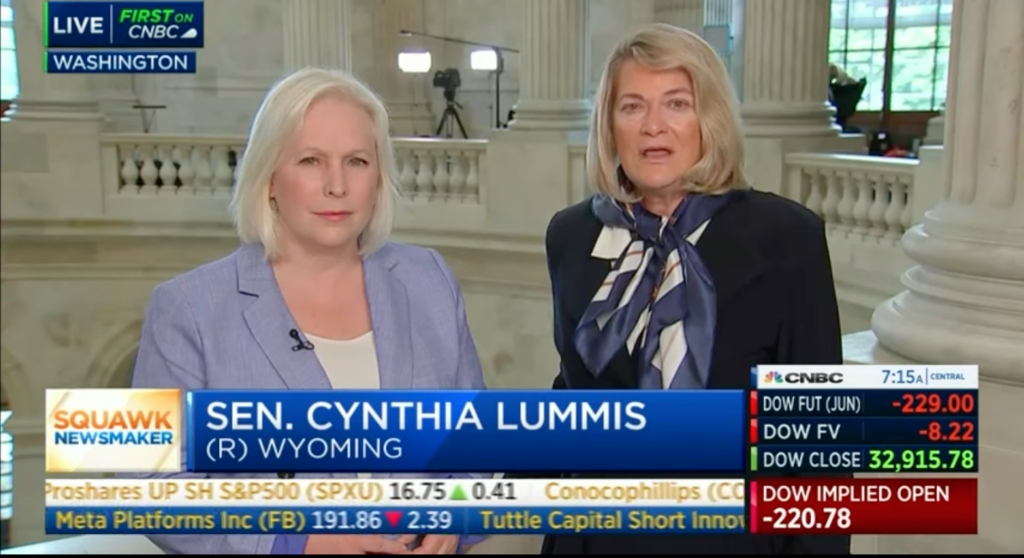Lummis Reintroduces Bipartisan Cryptocurrency Regulation Bill
Wyoming senator takes fresh approach to taming digital currencies’ financial ‘Wild West’
- Published In: Politics
- Last Updated: Jul 13, 2023

Appearing on CNBC Wednesday morning, Sen. Cynthia Lummis (R-Wyo.) argued her newly-released bipartisan cryptocurrency regulation bill was needed to ensure clarity for the industry. (Photo via CNBC)
By Jacob Gardenswartz
Special to the Wyoming Truth
WASHINGTON — The digital asset industry in recent years has been plagued by controversy, from the collapse of the FTX exchange and subsequent prosecution of its founder, Sam Bankman-Fried, to the closure of top cryptocurrency hub Signature Bank by federal regulators in March.
Lawmakers, financial experts and industry executives agree: one way to prevent future catastrophes is to establish clear regulatory guidelines cryptocurrency companies must follow. But developing a regulatory framework for a new and complex industry is no easy task.
On Wednesday, Sens. Cynthia Lummis (R-Wyo.) and Kirsten Gillibrand (D-N.Y.) attempted to do just that, reintroducing “landmark” legislation to bring crypto assets “within the regulatory perimeter,” per a joint release from the senators. The bill builds on similar legislation introduced by the bipartisan duo last year, though it incorporates many changes they hope will increase its chance of passage; last year’s version never even made it to the Senate floor for a vote.
The 2023 Lummis-Gillibrand Responsible Financial Innovation Act, dubbed by some “Lummis-Gillibrand 2.0,” beefs up the sections pertaining to consumer protections and incorporates feedback from senior officials within the Securities and Exchange Commission (SEC). It also builds in new safeguards to ensure a crypto collapse like FTX’s “never happens again,” according to a fact sheet shared by Lummis’ office.

“Crypto assets are constantly evolving, and as the industry changed during the last year, Senator Gillibrand and I worked to improve our legislation to ensure it appropriately balances consumer protections while allowing innovation to continue,” Lummis said in a statement announcing the bill’s reintroduction. “Make no mistake, bad actors exist, but we cannot lose sight of the potential of crypto assets and distributed ledgers to modernize our financial industry.
What’s in the bill?
The senators’ bill, which comes in at a whopping 274 pages and the text of which was obtained by the Wyoming Truth, would impact numerous portions of the cryptocurrency industry, from consumer safety and law enforcement to banking and taxation.
Currently, most cryptocurrency regulation at the federal level has taken place retroactively, when enforcement agencies sue companies for failing to register properly. This was the case with the recent charges the SEC filed against top crypto exchanges Binance and Coinbase.
Such a system has created an environment whereby crypto companies struggle to know what rules to follow, Lummis argues.
“This legislation is not only needed to protect consumers, but so there are rules of the road for these companies,” she told CNBC’s “Squawk Box” Wednesday morning. “Right now, they’re being governed by enforcement actions at the SEC, rather than being told, ‘Here’s what you need to comply with.’”
The new bill would establish clear definitions and rules delineating how different types of crypto assets should be treated. Because different agencies are charged with regulating different types of holdings, one major question hanging over the digital asset space concerns what digital currencies really are: commodities —tangible goods like gold or oil or securities —financial holdings like stocks and bonds.
Rather than taking a one size fits all approach, Lummis-Gillibrand 2.0 establishes rules so different digital assets could be regulated as either commodities or securities, and defines a new type of holding — “ancillary assets” — which fall into a nebulous gray area. In general, the bill would enable most crypto tokens to be regulated as commodities, empowering the Commodities Futures Trading Commission (CFTC) with far greater authority over the crypto space than it currently holds.
This approach is similar to a proposal laid out by Jay Clayton, the former SEC chairman, and Timothy Massad, the former CFTC chair, in the Wall Street Journal last week.
“We’re very deliberately saying, ‘we don’t have to resolve that issue, in order to put in place some basic investor protection standards,’” Massad, who was consulted on the new legislation, told CoinDesk Wednesday. “Let’s require these platforms to provide some basic disclosure on a token before it’s listed for trading, and that actually will help us determine what’s a security.”
Beyond establishing those definitions, the bill also proposes the creation of a go-between entity, dubbed the “Customer Protection and Market Integrity Authority,” to facilitate regulatory cooperation between the SEC and CFTC, allocating $500 million to each agency to manage such a project.
To protect consumers from the instability which has plagued the industry, the legislation would significantly beef up crypto companies’ transparency and communications requirements, establishing rules for how crypto tokens could be advertised and laying out cybersecurity standards to ensure crypto assets’ safety.
To ensure crypto assets aren’t used for illicit activities, the bill lays out guidelines to help law enforcement agencies prevent money laundering and sanctions evasion, and increases the penalties for those who break financial laws using cryptocurrencies.
Most importantly, the bill would impose new risk management standards for cryptocurrency lending banks, explicitly banning “rehypothecation” — when banks lend out more money than they have in their own coffers. Such a practice was central to the recent bankruptcies of crypto exchanges like Bittrex.
Under the new legislation, digital assets tied to fiat currencies like the dollar — better known as stablecoins — could be issued by only banks supervised by federal and state regulators, reigning in an industry SEC chair Gary Gensler has called the “Wild West.”
As with the anti-rehypothecation rules for other crypto lending, the legislation would require such banks to hold 100% of the face value of all outstanding stablecoins, hedging against the possibility of a crypto bank run. Payment stablecoins would further be defined as “neither a commodity, nor a security,” allowing them to resist in a gray area.
What comes next?
The changes made to Lummis-Gillibrand 2.0 appear likely to help the bill proceed further along the difficult path to becoming law. It includes “feedback” from SEC stakeholders and incorporates language from other regulatory proposals of top crypto skeptics like Sen. Elizabeth Warren (D-Mass.).
Still, passing legislation as far-reaching as this in the lead-up to a presidential election will be tough, particularly when many lawmakers don’t even understand what cryptocurrencies are.
“I don’t see much appetite in Congress right now, for building a consensus around something basically as large as this,” Massad said in the Wednesday interview with CoinDesk. “I think as we move into the election cycle, it’s just going to be very hard to build that kind of consensus.”
Another possible hang-up could be the price tag: the bill provides $1.4 billion in funding over five years, largely by extending the wash sale rule, which concerns tax reporting for traditional securities sold at a loss and then repurchased within 30 days, to include crypto investments as well. The GOP by and large opposes any new taxes, and a group of House Republicans is already working on a competing crypto regulation proposal.
And even with the tax expansions, winning over skeptical Democrats could be difficult as well. Lummis and Gillibrand’s bill exempts cryptocurrency users from paying taxes on gains made from mining or staking activities until they cash out such assets. Moreover, crypto tokens used to pay for goods or services under $200 could be exempt from tax altogether — proposals unlikely to secure Democratic support.













